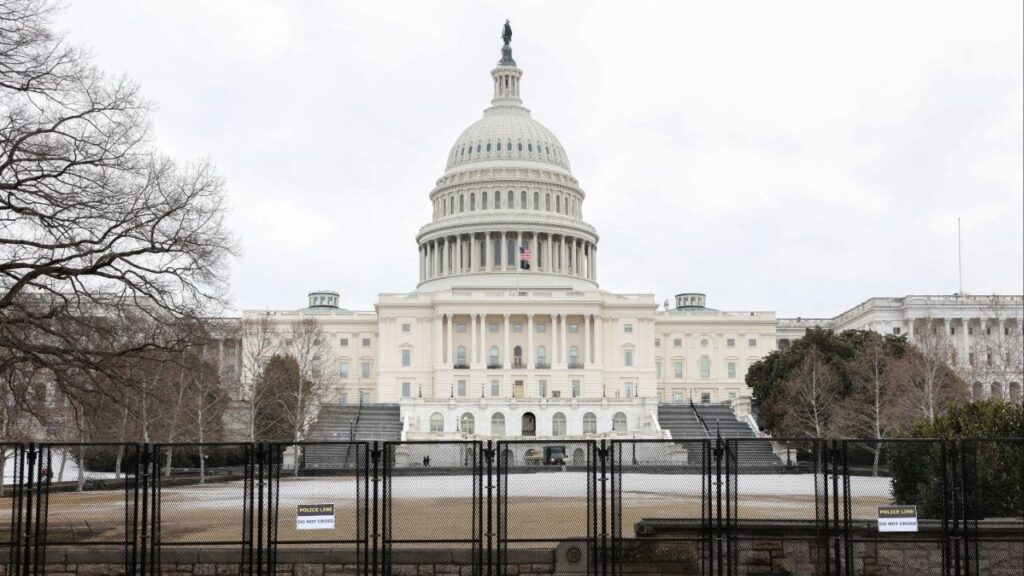Gov. Gavin Newsom of California speaks during a news conference in Sacramento, Calif., Jan. 10, 2024. Shoplifting and fentanyl use have tested the patience of California voters, who will decide in November whether to impose stricter laws that would lead to more incarceration. (Jim Wilson/The New York Times)

- Voters may roll back a 2014 measure that reduced penalties for theft and drug possession.
- Target, Home Depot, and Walmart back a new measure for stricter punishments on shoplifting.
- Governor Gavin Newsom prefers tightening theft laws without increasing prison sentences.
Share
|
Getting your Trinity Audio player ready...
|
LOS ANGELES — Deodorant, shampoo and underwear are all under lock and key in many stores in California. Retail clerks are often told to ignore shoplifters, after a handful of store employees who confronted thieves were assaulted or killed. Video clips of smash-and-grab crews snatching armloads of merchandise have gone viral.
Californians Fed Up
Californians of all political stripes have become fed up with the problems plaguing supermarkets and retail stores, not to mention car break-ins and open-air drug use. Some top Democrats, including San Francisco Mayor London Breed, have joined conservatives in denouncing a cascade of smaller crimes that have contributed to a sense of lawlessness in major cities.
Now, the state’s lawmakers and voters are weighing what to do.
With public sentiment in the state shifting toward stiffer punishment, California finds itself debating whether to roll back decade-old changes that sharply reduced the state’s inmate count and made it a leader in reducing mass incarceration.
Related Story: Wired Wednesday: Prop 47 Reform and Poison Pill Legislation
Reversing Proposition 47
A coalition of law enforcement figures, business owners and relatives of fentanyl addicts want to reverse the 2014 ballot measure known as Proposition 47, which reduced penalties for shoplifting and drug possession. That measure has been blamed so often for the state’s crime woes that it is among the few past initiatives that residents can identify by number — right up there with Proposition 13, the state’s landmark property tax limitation, and Proposition 209, the state’s prohibition of affirmative action.
With financial help from giant retailers Target, Home Depot and Walmart, the coalition has gotten a ballot measure qualified for the November election that would impose harsher punishments for crimes that result in lighter charges or no prosecution today.
Many Democratic state leaders, including Gov. Gavin Newsom, have acknowledged the state’s crime problems. Newsom was captured on a hot mic in February describing a shoplifting episode at a Target store in which he witnessed a man shoplifting without being confronted by anyone. “I was like, ‘Why am I spending $380 — everyone can walk the hell right out,’” he said.
But Newsom and Democratic legislative leaders say changing Proposition 47 is the wrong way to go. They argue that the new ballot measure would result in thousands more incarcerations, at a cost to the state of hundreds of millions of dollars, at a time when Democratic leaders want to close prisons. They want to leave Proposition 47 intact, and pass legislation in August that would tighten laws on retail theft and repeat offenders.
Related Story: California Officials Debate Prop. 47 Changes to Curb Crime. On the Street, ...
Prop 47 Reduced Drug-Possession Crimes
Proposition 47 reduced most drug-possession crimes to misdemeanors, and raised the threshold for thefts to be charged as felonies, to $950 in property or more. The measure allowed people to get out of prison early if they were incarcerated under the old laws, and it reduced the number of people sent to prison. It also funneled hundreds of millions of dollars to services for people returning home from prison, helping to reduce the rate of recidivism, according to a study by a state regulator.
The fate of Proposition 47 will be decided by California’s nearly 27 million eligible voters in November. Nearly 1 million people signed a petition to amend Proposition 47 by imposing tougher sentences for shoplifting and drug possession.
The issue of how to address a surge in retail theft and the devastation of the overdose crisis provoked a political brawl this summer in Sacramento, California’s capital. Fearing that the measure backed by law enforcement officials would go too far, Newsom and his allies tried to place on the ballot their own more moderate initiative, which would have addressed the problem of repeat thieves but would have stopped short of reimposing prison sentences for drug possession.
Related Story: Prop 47 Reformers Send Nearly a Million Signatures to Sacramento
Newsom Abandons Effort
Newsom, by then distracted by national politics after President Joe Biden’s disastrous debate, quickly abandoned that effort, saying they could not get it done in time to place it on the November ballot. At the same time, negotiations with the tough-on-crime coalition to kill the more sweeping initiative failed.
“They refused, opting to instead push a ballot measure that would revive policies from the era of mass incarceration and the failed War on Drugs,” Newsom said.
A decade ago, the criminal justice debate unfolding in California was very different. The U.S. Supreme Court had ordered California to reduce the populations of its overcrowded prisons. Then-Justice Anthony Kennedy, writing for the majority, said the crisis had led to “needless suffering and death.” And he sprinkled his opinion with sordid details of suffering: suicidal inmates locked in cages the size of a telephone booth; one toilet for 54 prisoners; sick inmates routinely denied medical care and dying because of it.
California voters responded by passing a series of measures, including Proposition 47, that reduced sentences, offered early parole and relaxed the state’s “three strikes” law. But in the years since, prosecutors and law enforcement officials have said Proposition 47 stripped them of the tools to effectively deter crime.
On a given day, there are now fewer than 100,000 people in California’s prisons, compared with about 160,000 when the Supreme Court issued its order.
Backers of this year’s rollback measure, known as Proposition 36, believe that fed-up voters will see that cost as worthwhile.
“What used to be a simple five-minute trip to the store has now become a ritual of clicking call buttons and waiting, sometimes ages, to get something as simple as a razor,” said Christian Medina, 26, who delivers groceries for Instacart in the Southern California city of Whittier.
At a Target store in Pasadena recently, Steven Wahl, 63, found the two items he was looking for — a charging cable and Tylenol — behind lock and key. “In the past, I’ve seen very expensive electronics locked up, and I kind of understand that because they are expensive, but now it really does feel like the most basic items are locked up,” he said.
Wahl said he did not know enough yet to decide how to vote on the November ballot initiative, but he was dismayed that some people had blamed the retail theft crisis on homeless people and had accused them of stealing things to sell on the street.
“I think they’re loading too much of this onto the homeless trying to sell things, when the homeless are just trying to live from day to day,” he said. “I think what we need to start thinking about is maybe doing more for our homeless, and worry less about locking everything up.”
–
This article originally appeared in The New York Times.
By Tim Arango/Jim Wilson
c.2024 The New York Times Company
RELATED TOPICS:
Categories


















